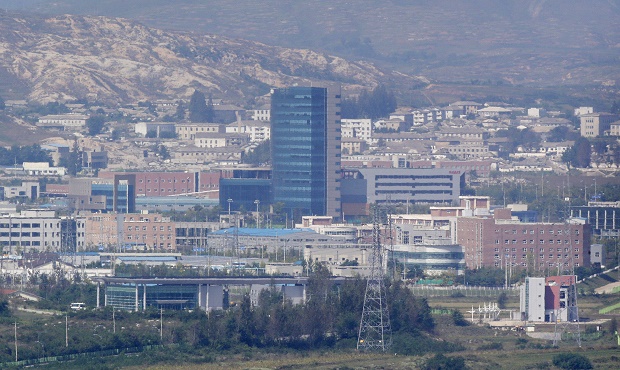
This Sept. 25, 2013, file photo shows the Kaesong industrial complex, seen from the Dora Observation Post near the border village of Panmunjom, which has separated the two Koreas since the Korean War, in Paju, north of Seoul, South Korea. North Korea on Wednesday, Nov. 4, 2015, blocked two South Korean officials from entering Kaesong industrial park, a jointly run factory park in North Korea, over what it described as a conflict between the countries’ management committees overseeing the complex. AP File Photo
SEOUL, South Korea—North Korea has withdrawn a ban imposed on two South Korean administrators from entering a jointly-run industrial complex in the North, a Seoul spokesman said Friday.
The South Korea-invested Kaesong industrial estate, which lies just across the border in North Korea, is regulated by a joint committee whose members—on the South side—come from the private sector or are former public officials.
North Korea said Tuesday it was banning two committee members from entering Kaesong, but offered no specific reason apart from a general complaint that they were “opposing the North’s policies.”
South Korea issued a formal protest and had been informed late Thursday that the “entry ban was lifted,” Unification Ministry spokesman Jeong Joon-Hee told reporters.
“It’s fine now, but such an incident should not be repeated in the future,” he said.
One of the two was Choi Sang-Chul, a retired ministry official and current vice chairman of the committee.
The Kaesong complex opened in 2004 and currently hosts more than 120 South Korean companies which employ some 53,000 North Korean workers.
The estate is a precious source of hard currency for the isolated and impoverished North. The South Korean firms get cheap labour as well as preferential loans and tax breaks from the government.
The vibrant industrial complex has remained largely immune to turbulent swings in inter-Korea politics.
The only exception came in 2013 during a period of heightened cross-border tensions when Pyongyang effectively shut down the zone for five months by withdrawing its workers.
Tensions flared again earlier this year after two South Korean soldiers were maimed on the border, but the two sides thrashed out an accord in August to calm things down.
The agreement envisaged the opening of high-level talks involving senior government officials, no such dialogue has been initiated.
“The government is making efforts to open the talks but no progress has been made so far,” Jeong said.
RELATED STORIES
S. Korea businessmen call for Kaesong deal
Hopes fade for revival of joint Korean industrial zone